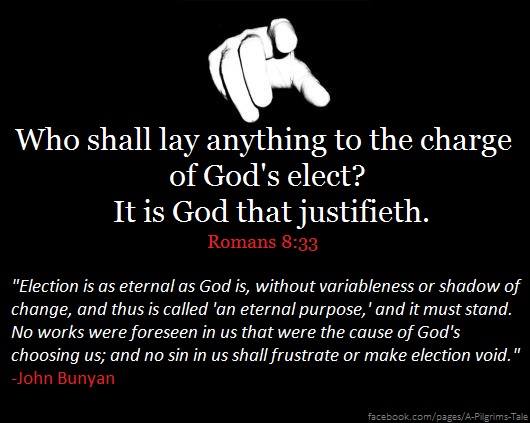What is Calvinism?
Calvinist, Paul Washer: “The Bible calls all men haters of God and enemies of God. You say, ‘but I’ve loved God ever since I was little.’ No, you loved an image of God that you created with your own mind and you loved what you made, but if someone would have come to you and pointed out the God of Scripture, you would have said, ‘I could never love a God like that.’ So many times I’ll go to people and they’ll say, ‘Well I’ve loved God all my life’ and I say, ‘Could I sit down with you for a half an hour and just explain from Scripture some of the historical Christian beliefs about God?’ and after a half an hour, a good churchman will say, ‘That’s not my God.’ I have to say, ‘of course it’s not, but it is the God of Scripture.’” (Total Depravity/Gospel, emphasis mine)
Of course, it is “historical” only if Christian history started in the 300’s with the Gnostic convert, Augustine. Prior to that, Calvinism was more closely aligned with Gnosticism, which the early Church fought against. So what you will find out is that “some of the historical Christian beliefs” are actually the Calvinist historical beliefs, in which Calvinism is superimposed upon Scripture, in being presented as the gospel behind the gospel, and so when “a good churchman” rejects the imposition of Calvinism upon Scripture, he is told that he has rejected the “God of Scripture.”
John Calvin: “Further, Augustine is so much at one with me that, if I wished to write a confession of my faith, it would abundantly satisfy me to quote wholesale from his writings. But, not to be too prolix on the present occasion, I shall be content with three or four passages by which it will be established that not even in a single point does he differ from me. From the whole course of the work, it could be established even more fully how solidly he agrees with me in every particular.” (Concerning the Eternal Predestination of God, p.63, emphasis mine)
So why isn’t Calvinism called Augustinianism? Because John Calvin popularized it, just as Jacob Arminius (1560-1609) popularized the opposition view, now known as Arminianism. Arminius, himself, had been a Calvinist, until convinced otherwise by those with whom he was set to debate.
Calvinism is known as the Doctrines of Grace, so named for its several elements of Grace such as Sovereign Grace, Elective Grace, Adoptive Grace, Atoning Grace, Regenerative Grace, Persevering Grace and Temporal Grace. Each of the Graces are indicative of the 5-Points of Calvinism known as the Tulip System:
Total Depravity
Calvinist, Erwin Lutzer on the Doctrine of Total Depravity: “Thus the doctrine of total depravity leads directly to that of unconditional election--a dead man cannot respond to the gospel’s appeal.” (The Doctrines That Divide, p.181, emphasis mine)
This is a teaching whereby unregenerate, natural man cannot believe in Jesus no matter how much he hears the preaching of the Gospel (Romans 10:17), no matter how hard the Holy Spirit pricks (John 16:8), no matter how long Jesus knocks (Revelation 3:20), because the Law of the Total Depravity of man cannot be overcome unless the Holy Spirit first regenerates his nature in being made preemptively and unconsciously born again in order to believe.
Unconditional Election
Calvinist, Erwin Lutzer: “Why, then, is one person saved and another lost? The Arminian says the difference is to be found in man. … The Calvinist says that the difference is in God, for all men are equally in bondage to sin. Any differences in disposition is due to his work in the human heart. Thus since some are saved, it must be that God has elected them.” (The Doctrines That Divide, pp.180-181, emphasis mine)
John Calvin on the Doctrine of Unconditional Election: “For God looks at nothing outside Himself by which He is moved to elect us, for the counsel of His own will is the only and proper and (as they say) intrinsic cause of election.” (Calvin’s New Testament Commentaries: Galatians, Ephesians, Philippians and Colossians, p.130, emphasis mine)
John Calvin on who Election is in: “Paul further confirms this, declaring that God was moved by no external cause; He Himself and in Himself was author and cause of our being elected while yet we were not created, and of His afterwards conferring faith upon us.” (Concerning the Eternal Predestination of God, p.69, emphasis mine)
Calvin states: “God’s grace is illustrated by the fact that he does not give away salvation indiscriminately, but gives to some what he denies to others.” (Institutes of Christian Religion, p.213, emphasis mine)
John Calvin on Sovereign Grace: “There are some, too, who allege that God is greatly dishonored if such arbitrary power is bestowed on Him. … they should look up to the sovereignty of God and not evaluate it by their own judgment.” (Calvin’s New Testament Commentaries: Romans and Thessalonians, pp.209-210, emphasis mine)
By the decree of God, certain sheep were created to spend eternity with Jesus in everlasting glory, while certain goats were created by necessity, to ultimately spend all eternity in the Lake of Fire. Calvinists implore you to praise God for creating you to be one of His sheep, instead of a goat.
Limited Atonement
Lutzer on Limited Atonement: “This simply means that Christ did not die for all men in general but gave himself only for the church, the elect.” (The Doctrines That Divide, p.183, emphasis mine)
Lutzer adds: “If it is true that Christ died to redeem a specific number of people, namely those whom the Father had given him, it follows that all believers were redeemed at the cross two thousand years ago. They were cleared of all charges then, for God accepted the ransom payment. The certificate of our canceled debt was then given to us when we trusted Christ.” (The Doctrines That Divide, p.185, emphasis mine)
This teaching has led some Calvinists to caution that we ought not just tell anyone that Jesus died for them, because you could be lying to them if they were not one of the elect that Jesus alone died to save. A “4-Point” Calvinist is a Calvinist who believes that Christ’s Atonement was unlimited in scope, and points to statements by John Calvin for support:
John Calvin: “That Christ, the redeemer of the whole world, commands the Gospel to be preached promiscuously to all does not seem congruent with special Election. ... But the solution of the difficulty lies in seeing how the doctrine of the Gospel offers salvation to all. That it is salvific for all I do not deny. But the question is whether the Lord in His counsel here destines salvation equally for all.” (Concerning the Eternal Predestination of God, pp.102, 103, emphasis mine)
John Calvin: “Therefore Christ intends that the benefit of his death should extend to everyone; so people who exclude anyone from that hope of salvation are doing Christ a disservice.” (1 & 2 Timothy & Titus: Calvin, The Crossway Classic Commentaries, p.40, emphasis mine)
John Calvin: “It is incontestable that Christ came for the expiation of the sins of the whole world.” (Concerning the Eternal Predestination of God, p.148, emphasis mine)
What’s the difference between a 4-Point and a 5-Point Calvinist? First of all, you need to know what they agree on. Every single Calvinist agrees that for whom God elects, He regenerates (irresistibly), and for whom He regenerates, He perseveres in the faith. The only difference between the 4-Point and 5-Point Calvinist is the nature of Christ’s Atonement at Calvary, with the primary difference being to whom it is applied and when it is applied. The 4-Point Calvinist teaches that for those whom God regenerates (with Irresistible Grace), receive faith, and through that faith, and at the very moment of faith, receive the benefits of Christ’s blood applied to their account. In this way, Jesus died for all, but the benefit of the cross is only received by those who believe. (Arminians agree about the extent of the Atonement, being for all, and agree with how a person receives it, that is, by faith. Of course, Arminians disagree on Elective Grace and irresistible Regenerative Grace.) In contrast, the 5-Point Calvinist teaches that Jesus only died for a limited number of people, that is, Calvinism’s elect, and that these received the benefit of the Atonement, not upon the moment of faith in Christ, but 2,000 years ago at Calvary, having secretly been purchased way back then.
Irresistible Grace
Calvin on preemptive, Regenerative Grace: “Hence it follows, first, that faith is not produced by us but is the fruit of spiritual new birth. For the evangelist says that no one can believe except he who is born of God. Therefore faith is a heavenly gift. Moreover, faith is not cold and bare knowledge, for no one can believe unless he is born again by the Spirit of God.” (John: The Crossway Classic Commentaries, p.24, emphasis mine)
A man must be made born in order to be able to believe in the Gospel. Unless a man is made born again by the grace of Regenerative and had his eyes spiritually opened by the Spirit of Illumination, he cannot believe in the Gospel.
Perseverance of the Saints
Calvin on Perseverance of the Saints: “Let no one think that those [who] fall away...were of the predestined, called according to the purpose and truly sons of the promise. For those who appear to live piously may be called sons of God; but since they will eventually live impiously and die in that impiety, God does call them sons in His foreknowledge. There are sons of God who do not yet appear so to us, but now do so to God; and there are those who, on account of some arrogated or temporal grace, are called so by us, but are not so to God.” (Concerning the Eternal Predestination of God, p.66, emphasis mine)
Only the elect endure to the end by the Grace of God. Those who appear to us as Christians but who later fall away, merely had Temporal Grace. Calvinism is essentially that by the eternal Decree of God, some have been unconditionally chosen into the eternal flock of the Father, whom Jesus alone died at Calvary to save, whom the Holy Spirit at the appointed time secretly regenerates with the grace of saving faith and strength to endure faithfully to the end. Sovereign Elective Grace determines Regenerative Grace which provides Persevering Grace, unless you’ve been given Temporal Grace.
Decree of Predestination
The Calvinistic, Westminster Confession of Faith: “III. By the decree of God, for the manifestation of his glory, some men and angels are predestinated unto everlasting life; and others foreordained to everlasting death.” Additionally, it states: “VII. The rest of mankind, God was pleased, according to the unreachable counsel of his own will, whereby he extendeth or withholdeth mercy, as he pleaseth, for the glory of his sovereign power over his creatures, to pass by; and to ordain them to dishonor and wrath for their sin, to the praise of his glorious justice.” (Westminster Confession of Faith, III. Of God’s Eternal Decree, emphasis mine)
Calvin on God’s eternal Decree: “We also note that we should consider the creation of the world so that we may realize that everything is subject to God and ruled by his will and that when the world has done what it may, nothing happens other than what God decrees.” (Acts: Calvin, The Crossway Classic Commentaries, p.66, emphasis mine)
John Calvin: “First, the eternal predestination of God, by which before the fall of Adam He decreed what should take place concerning the whole human race and every individual, was fixed and determined.” (Concerning the Eternal Predestination of God, p.121, emphasis mine)
John Calvin: “God had no doubt decreed before the foundation of the world what He would do with every one of us and had assigned to everyone by His secret counsel his part in life.” (Calvin’s New Testament Commentaries: Galatians, Ephesians, Philippians and Colossians, p.20, emphasis mine)
John Calvin: “…the reason why God elects some and rejects others is to be found in His purpose alone. … before men are born their lot is assigned to each of them by the secret will of God. … the salvation or the destruction of men depends on His free election.” (Calvin’s New Testament Commentaries: Romans and Thessalonians, p.203, emphasis mine)
John Calvin: “At this point in particular the flesh rages when it hears that the predestination to death of those who perish is referred to the will of God.” (Calvin’s New Testament Commentaries: Romans and Thessalonians, p.208, emphasis mine)
John Calvin: “But here he runs full sail against God for determining some from their very creation to destruction.” (Concerning the Eternal Predestination of God, p.78, emphasis mine)
John Calvin: “...the secret counsel of God whereby He chooses some to salvation and destines others for eternal destruction.” (Concerning the Eternal Predestination of God, p.53, emphasis mine)
This is referred to as Determinism, and has historically drawn the criticism of being Fatalism, and making God the “author of sin,” both being points that Calvinists vehemently dispute.
TULIP
T: Total Depravity (Total Inability)
U: Unconditional Election (Elective & Adoptive Grace)
L: Limited Atonement (Particular Redemption, Atoning Grace)
I: Irresistible Grace (Regenerative Grace)
P: Perseverance of the Saints (Eternal Security, Persevering Grace)
Question: What is John Calvin’s role in “Calvinism”?
Answer: John Calvin did not invent Calvinism. Rather, John Calvin (1509-1564) popularized the teachings of Augustine (354-430).
Question: What is “Calvinism”?
Answer: Based upon a misquote of Ephesians 1:4, “Calvinism” is the teaching that God, before the creation of the world, and before anyone was ever born, made an unchangeable decree to choose certain persons to be saved. (This leaves out the part about “in Christ,” and hence the charge of a misquote.) Calvinism teaches that man cannot choose God because man is Totally Depraved, and hence God has no other possible option but to use an Irresistible Grace, in order to save those for whom it was prearranged to save (which ultimately, then, limits God in a way that makes God have Total Inability to reach lost sinners except by use of an Irresistible Grace). According to full 5-Point Calvinists, Jesus did not die for all men, but only for those who are prearranged for salvation. As such, the essence of Calvinism is a presumed special grace from the Father, whereby they are unconditionally loved, while their neighbor is unconditionally hated, in which God gets glory from their neighbor being predestinated for Hell. To a Calvinist, Calvinism is the Gospel behind the Gospel.


